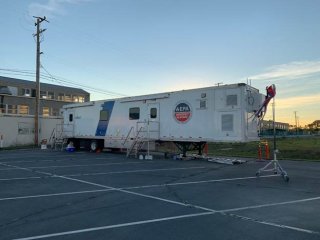PHILIS (Portable High-throughput Integrated Laboratory Identification System)

The Portable High-throughput Integrated Laboratory Identification System (PHILIS) is EPA’s suite of mobile laboratories for the on-site analysis of environmental samples contaminated with chemical warfare agents, pharmaceutical-based agents, and toxic industrial compounds. PHILIS is part of EPA’s Environmental Response Laboratory Network.
PHILIS provides on-site analysis for:
- Chemical, biological, radiological, and nuclear incident response actions
- Accidental chemical releases
- Natural disasters
To request PHILIS assistance, please call the CBRN CMAT 24/7 Phone Duty Officer at 202-250-8770 or EPA’s 24/7 Emergency Operations Center at 202-564-3850.
PHILIS Portable High-Throughput Integrated Laboratory Identification System (pdf)
On this page:
- Analytical Capabilities
- Operational Capabilities/Sustainment
- PHILIS Fleet/Locations
- Why does PHILIS deploy?
What are the Analytical Capabilities and Applications of PHILIS?
PHILIS labs are accredited and certified where applicable for organic chemical analyses, including:
- Chemical warfare agent compounds and degradation products
- Pharmaceutical based agents (fentanyl and other opioids)
- Volatile and semi-volatile organic compounds
- Polychlorinated biphenyl compounds
- Gas and diesel range organics
- Organophosphorus and chlorinated pesticides
PHILIS labs do not have the capability to analyze coliforms in drinking water.
PHILIS Operational Capabilities/Sustainment
PHILIS labs can be road-worthy within four hours of notification and set up and running within six hours of arrival on site. The labs can run for four days before restocking or refueling is required as they are operated via diesel generators or connection to shore power (when available). Additionally, there are separate preparation and analytical areas, reducing potential sample contamination.
PHILIS mobile labs:
- Reduce turn-around time for data
- Enhance on-site decisions
- Provide reliable on-site data for facility clearance decisions
- Eliminate the need to ship/analyze samples off-site
PHILIS Fleet/Locations
The PHILIS fleet includes seven mobile laboratory units, including analytical trailers as well as sample preparation trailers, based in Edison, NJ and Castle Rock, CO. Both locations also maintain external generators to supply backup power to the labs during deployments where shore power is not an option.
Why Does PHILIS Deploy?
PHILIS provides surge analytical capacity at the point of need. Mobilizing to a location near the sampling area significantly reduces the time delay between sample collection and laboratory analysis. This results in actionable and validated data being delivered to the deployment site much more rapidly.
PHILIS is positioned to support different types of deployments, including:
- Chemical warfare agent preparedness and training exercises
- Natural disaster response
- Chemical releases and emergency responses/removals
- Superfund remediation projects
PHILIS can also provide analytical support from the Edison, NJ and Castle Rock, CO home bases for less time-critical projects.
